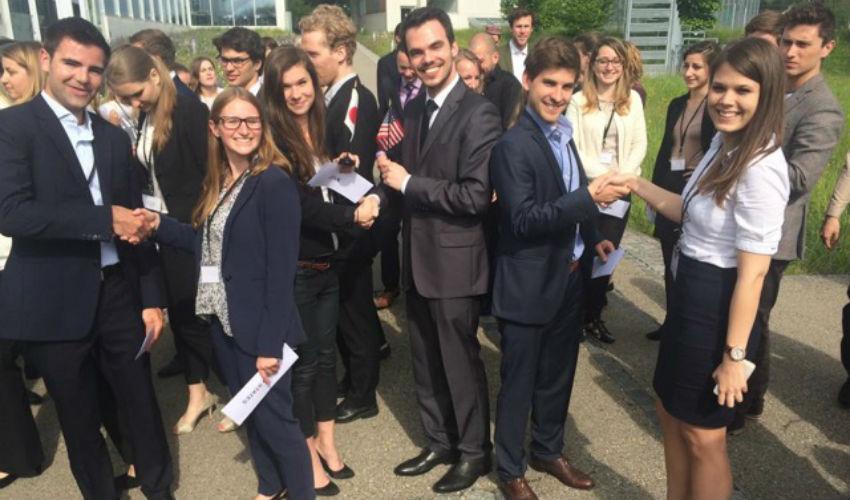
Eight Bocconians at Climate Negotiations
GREEN MANAGEMENT AND CORPORATE SUSTAINABILITY STUDENTS PLAYED THE ROLE OF INTERNATIONAL NEGOTIATORS AT ST. GALLEN'S MODEL UNITED NATIONS FRAMEWORK CONVENTION ON CLIMATE CHANGEEight students of the Green Management and Corporate Sustainability course (for graduate students) have played the role of international negotiators during the Model United Nations Framework Convention on Climate Change (UNFCCC). The role-playing game, which was held in St. Gallen, Switzerland, last Friday and Saturday, simulates the Conference of the Parties to be held in Paris between November 30 and December 11, 2015. The so-called COP21 is expected to produce a global climate agreement for reducing greenhouse gas emissions and limiting global warming to 2 degrees, a result that has not been achieved in previous negotiations.
Divided into three groups, the eight Bocconi students played the roles of Japan, Poland and Argentina. They confronted 120 international other students from CEMS universities. The influence of the press and NGOs invited to the conference was also simulated. “We represented the 4th largest global economy, Japan”, says Bob den Hartog. “We learned about the incredible strength of coalitions in pressuring other nations, solidified by the strong ties to the USA and Australia. Our coalition often met in secrecy to reevaluate common goals as well as devise new strategies”. Den Hartog and his colleagues Aleksander Ostrowski and Stefánia Vág left St. Gallen “satisfied with an unparalleled amount of first-hand learning but also an even better understanding of global politics and climate change”.
Roman Wigger and Lucia Piazza represented Poland. “The role play let me understand how to judge processes and outcomes of such conferences in a new and better way”, Wigger says. “Often the outcome is not as good as expected, but reaching an agreement which needs consensus is far from easy. Having every party signing the agreement is a great and important success”. Diana Guida agrees. She played the role of the delegate from Argentina alongside Karoliina Korpela and Karl Brussolo. “Country representatives have to stay really focused. They must think fast and act faster. Feelings must be controlled, emotions must sometime be hidden, and every sentence must be carefully worded. The energy in the air was palpable, as well as the willingness to find a sustainable solution, but frustration can destroy your initial motivation to be constructive throughout the whole process. It’s hard to strike the right balance between fruitful discussions and time-consuming, excessive focus on details”.
The role play is the third module of the course directed by Stefano Pogutz. The first part is intended to design scenarios of the big challenges businesses and institutions are going to face in the field of climate, energy and ecosystem services. The second module analyzes the behavior of firms through case studies. The third module is worth 50% of the final assessment and is split in two: a field project with Accenture and the UNFCCC role play. Before the trip to Switzerland, students were asked to draft two documents. The background paper is an analytical report on the condition of the country represented by the students and on the drivers that influence climate policies. The position paper contains the objectives of the negotiation, some transparent, some confidential.
“The role play” Pogutz says “engages students in active learning. They develop analytical skills by linking environmental issues to companies’ behaviour. They test the leadership skills necessary to manage the group and the negotiation. They look for strategies to implement. After Kyoto, the economic costs of reducing emissions of CO2 have prevented a new agreement. But it’s a cost that you ought to incur, just like an insurance, to avoid future risk of huge cuts to global GDP as a result of the unpredictable effects of climate change. It’s also a chance: innovation and technology organization turn the problem of climate change into an opportunity”.
by Claudio Todesco
